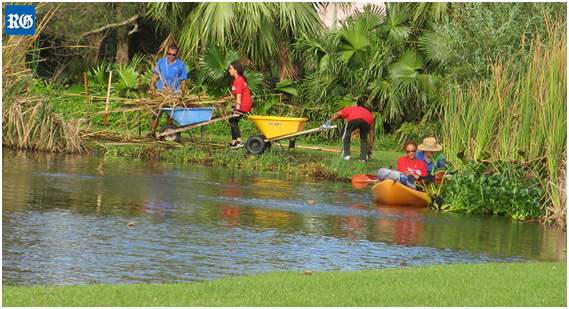Recent News
Aquarium welcomes two feathered friendsWednesday, April 22, 2015
The Bermuda Aquarium, Museum and Zoo is celebrating the arrival of two new feathered additions to the animal population.
Aquarium revamp set for mid-June finish
Tuesday, April 14, 2015
A major renovation of the aquarium is expected to be completely finished by mid-June. It had initially been hoped that the aquarium would be open to the public again by the end of this month.
Kate takes the plunge at Deep Sea World
Friday, April 10, 2015
When Bermudian Kate Cooper settles down to her new job training seal pups and diving in the tanks at Scotland’s Deep Sea World, she will have her early start in Bermuda’s own aquarium to thank for the opportunity.
Cancer survivor’s view beneath the waves
Wednesday, April 08, 2015
Ron Lucas was scuba diving 12 days after he completed treatment for his prostate cancer.
Deep sea squid found off The Reefs
Saturday, March 28, 2015
A squid carcass several feet long that washed up at a beach in Southampton looked so alive that diver Choy Aming had to check to make sure.
About
GovernanceAbout Us
Newsletter
Latest News
Gift & Bookstore
Contact
General Inquiries
info@bzs.bm
Latest News
All the latest updates and news from the Bermuda Aquarium, Museum, and Zoo, one of Bermuda's leading visitor attractions!
Jonathan Bell
Published Jan 16, 2018 at 8:00 am (Updated Jan 16, 2018 at 6:41 am)

HSBC volunteers help a Bermuda Zoological society team clean up
Cloverdale Pond in Smith's (Photograph supplied)
Two ponds have been cleaned up courtesy of an island conservation programme.
Cloverdale Pond in Smith’s and Southampton’s Evan’s Pond, a refuge for endangered species, were improved through the Bermuda Zoological Society’s wetlands remediation programme.
The scheme, which became the HSBC global water programme for Bermuda in 2014, was designed to remove toxic petroleum compounds from ponds.
The build-up of the poisonous hydrocarbons is a threat to the island’s two endemic killifish species, as well as native diamondback terrapins, which are a protected species.
The compounds, which come from oil, water runoff and vehicle exhausts, can be broken down by bacteria when the pond sediments are aerated.
The two-year grant from HSBC allowed the proposal to be tested in the field.
Volunteers also took part, with help from the Department of Environment and Natural Resources.
The BZS said Cloverdale was chosen first because of its small size, its “known severe effects on wildlife” and the absence of protected species in the water.
Evan’s Pond was selected as the second test site because of its small population of killifish.
The ponds were divided into sections and aerated for six to eight hours a day with solar powered compressors.
Hydrocarbon levels saw a major reduction over the course of a year.
The next site for remediation is the South Pond at the Mid Ocean golf course, where the hatching of diamondback terrapins has been hampered by pollution.


